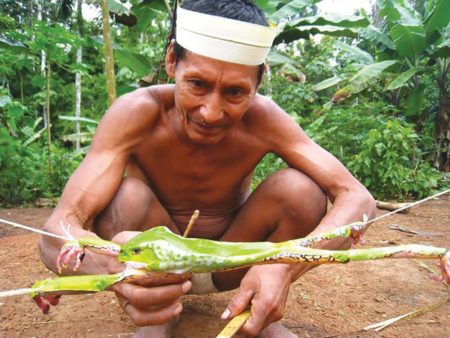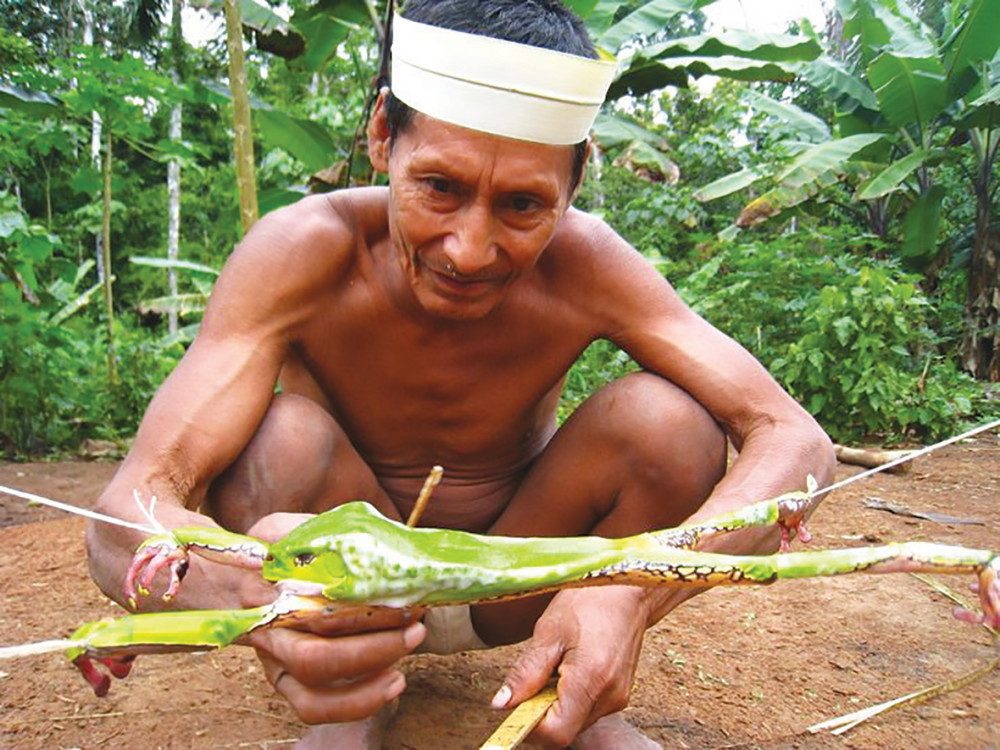The scene in Dunu’s hut starts to feel surreal as the nu-nu explodes into his head. The fine green powder carefully concocted by his shaman father from medicinal jungle plants is blown up his nostrils. The knowledgeable tribesman’s nu-nu begins its work: the pain in Dunu’s head subsides and out of the blackness he sees visions of jaguars, monkeys, tapirs, and then a dozen peccaries (wild boars) gathered after sunrise by the magnificent ceiba tree flanking the meandering Galvez River. Dunu groanes. Moments later the vision fades and Dunu is left in intoxicating relaxation.
The Matsés’ lives are so tied to the Amazon jungle that surrounds them that their culture has developed a refined knowledge of and interaction with their delicately balanced environment for survival and growth, medicines, architecture, clothing, hunting and trapping, agriculture, food preparation, tools, and just about everything. The Matsés have also learned to see the material and spiritual world as one, perceiving the spirits of animals, plants and trees, as well as people, as integral factors in their daily survival.

Dunu, having seen the peccary in his vision, will ready himself by sharpening the two-meter long arrows and adjusting his bow for tomorrow morning’s hunt. His preparation would not be complete however, without sapo to give him strength, endurance and harmony with the spiritual dynamics between the hunter and the hunted.
Thus beside the fire, the ritual is repeated as it has been done for centuries. His father carefully heats the end of a short piece of tamshi vine and then, with the red-hot tip, makes several burns on Dunu’s arms and chest. The young man flinches only slightly; the shaman sings a soothing song to the spirits of the animals he is to hunt. Then with the skill of a seasoned shaman, Dunu’s father scrapes the burnt skin from each mark and with a sharp piece of bamboo, applies mustered-colored slime, sapo, onto each open mark.
In a moment, Dunu feels his body begin to burn from within, his heart racing and throbbing loudly, his muscles tightening as he feels the darkness come upon him. While Dunu knows this medicine will give him strength and success for tomorrow’s hunt, somehow he also doesn’t want it. While the darkness reaches out to him and pulls him in, Dunu gasps. He wants out – and to be free from this power!
Sapo is made from the chemical excreted from the skin of the dow-kiet! – a large tree frog. The drug is administered in a ritual called kambo. Its chemical properties have recently been explained by western scientific inquiry. No such methodology, however, can explain its spiritual and divining powers.
The Matsés number about 2,000 in Peru and are the largest of six unreached tribal people groups in that country. They are proud of their Amazonia homeland and indigenous culture. Negative experiences with non-indigenous peoples have led many Matsés and conservationist groups to interpret Christianity as an unwanted influence and destroyer of their culture. While taking brave steps to protect themselves and their region from the encroachment of industrialized peoples, some Matsés youth and young adults are also finding ways to adopt and adapt various 21st century values represented, for example, by digital technology, cash economy, and mechanized transport. Meanwhile, little or no health care is accessible to the Matsés for the common maladies of malaria, yellow fever and hepatitis.
Pray for the Matsés…
- Pray for spiritually empowered and discerning followers of Jesus to reach out to the Matsés in culturally sensitive and helpful ways that convey Good News to this people group-nation.
- Pray for fruitful opportunities among Matsés people who have moved from their jungle villages into larger centers. May their hearts be longing and their eyes and ears prepared by God, open and ready to receive the powerful words of Jesus.
- Pray that many Matsés would become worshipers of the Lord of All Creation and be filled with his Holy Spirit through Jesus Christ.
